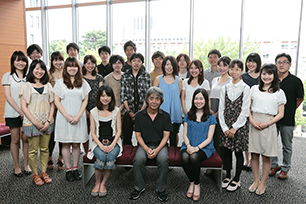Kazuaki Inoue, Professor, Faculty of Law, Department of Political Science
Study Africa and learn from Africa
This seminar class is filled with just as much diversity as Africa, composed of students with unique and brilliant characters. Every year, a number of my seminar class students actually set foot on African soil.

In recent years, Africa has gained increasing attention from the mass media even in Japan. However, on the whole, the images of Africa that Japanese people generally tend to hold can be summarized in the following three points: firstly, that it is a hot region due to its geographic location which straddles the equator; secondly, that it has a negative image of being the “the Dark Continent” due to the false image that there was no civilization or culture in the past and the current situation of the poverty, starvation, and civil wars are dominant nowadays in this continent; and thirdly, that it is one big realm full of wild animals, an image frequently broadcasted on TV and other media. However, these images represent only a small portion of the continent.
In a nutshell, Africa is about 80 times larger than the land area of Japan, and its estimated population is about a billion people. The continent’s climate varies from hot and humid to highland, where even summers are mild. Furthermore, 54 countries, or more than a quarter of the total member nations of the United Nations, exist in Africa, and about 1500 languages are spoken among the people who live on the continent. As such, Africa is a continent full of diversity. On the other hand, it is also a region where civil wars condemn people to struggle for survival and where poverty runs rampant. Our seminar class aims at studying these issues from the standpoint of political science based on a multidisciplinary knowledge of a range of other social sciences, and to seek answers and solutions together.
As if reflecting the diversity of the African continent, my seminar class students are also unique and full of diversity. As for this year, two out of 11 fourth-year students returned from studying overseas in Holland and Turkey in June, and out of the 13 third-year students, two will leave in September to study in the United States, and one will also leave in September to study in China. Also, a number of students from my class set foot on African soil every year, and all of this also seems to explain the characteristics of this seminar class.
Rather than forcing our own opinions on Africa, we must first learn from Africa, and then think about what we can do for Africa. Every class, we ponder over this difficult question.
Student's Voice
Hana Inoue, Fourth-year Student,
Faculty of Law, Department of Political Science
There is no meaningless question in Professor Inoue’s seminar class
In Professor Inoue’s seminar class, we take turns reading chapters from literature and articles on African countries, and also have discussions mainly on politics and a wide variety of themes, not limited to development assistance and anthropological issues. The diverse and multifaceted issues that Africa faces cannot be explained in a few words, and each class I become painfully aware of just how narrow my views are.
During the first class, our professor mentioned that there is no meaningless question in this class, which was really impressive. True to his words, Professor Inoue listens to even the most trivial questions and gently observes our discussions. I am really happy to be able to study in such an unconstrained environment, just like the wild animals living on the savanna, with our professor and our fellows in our seminar.
*Position titles, etc., are those at the time of publishing.
